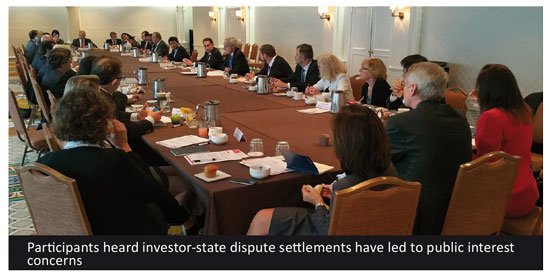Future of investor-state arbitration in serious doubt
Tribunals’ failure to properly value major foreign investments and the failure of investment arbitration to respect democratic principles mean confidence in the system is diminishing
The future of investor-state arbitration is being questioned with some lawyers speculating that such disputes will disappear, attendees at a recent Iberian Lawyer/Kluwer International event held in Washington DC heard. Speakers at the event said that the future of investment arbitration was in doubt given the failure of tribunals – which often lack expertise in economics – to handle the complex economic exercises needed to value major foreign investments affected by adverse state measures.
Participants also suggested that the future of investment arbitration could be doomed because of its failure to respect democratic principles, which is one of the main criticisms levelled at it, attendees heard. Other criticisms include a lack of transparency, a lack of consistency, as well as limited security. Support for investment arbitration is also diminishing because in cases where states want to expropriate without paying compensation, foreign investment is prioritised over domestic investment. Participants said this was because investment treaties impose a rule of law that goes beyond the domestic scenario and the aim of arbitration is to protect investors.
Public interest concerns
Investor-state dispute settlements have led to public interest concerns that have led to demands for greater transparency, consistency and public participation. Calls have been made for the creation of a permanent watchdog to hear disputes and impose transparency and for a categorisation of conduct that violates trade agreements. However, the solutions proposed face procedural and legal obstacles, attendees were told. One participant cited the example of NAFTA, which after 22 years has still failed to instate an investment arbitration mechanism.
With regard to the issue of whether tribunals are up to the task of valuing major foreign investments, a number of participants shared the view that many of the chairs of such tribunals have little experience in valuation. Attendees argued that the ideal tribunal would be made up of people with a good legal background, as well as an understanding of economics, in addition to having experience in accountancy and valuation. One solution suggested was having one panel making the legal decisions on liability and causation, and another panel of experts focusing on valuation. But it was argued that the determining of values is also a complex issue, given that there is such a vast range. By way of a short-term fix, it was proposed that the best way to proceed in the current climate is to ensure that tribunals engage with experts in valuation from the outset.
It was also recommended that an independent expert should be appointed to each case to explain issues to a tribunal. The hope is such an expert could specialise in financial matters and be consulted with a view to providing an explanation of complex cases as well as being tasked with asking questions during the process to improve the level of debate.












